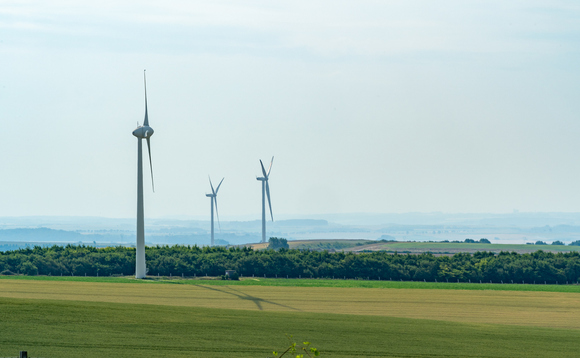Credit: iStock
Party wants to update National Planning Policy Statements and offer community benefits for renewables projects in bid to tackle barriers to clean energy development
Labour is plotting a major overhaul of the UK's planning system designed to rapidly accelerate the build out of renewable energy capacity should it win the next election, according to reports yesterday.
The Opposition - which has faced criticism in recent days after confirming that if elected it would not reach its goal of investing £28bn a year in the green industrial transition until 2027 at the earliest - signalled that a suite of planning reforms were under development to support its ambitious goal to decarbonise the UK power grid by 2030.
The Party has been touting its Green Prosperity Plan over the past two weeks, ahead of a full launch of the new strategy later this month.
As part of that Plan, Labour is aiming to rapidly expand wind, solar, and nuclear capacity across the UK so as to deliver a new zero emission grid by 2030, establish a state-owned green power develop dubbed GB Energy, effectively ban new oil and gas drilling in the North Sea, and deliver a nationwide household energy efficiency drive.
But in order to deliver its ambitious clean power goals, the Party is also seeking to revamp the UK's current planning rules, according to reports in The Sunday Times.
Under the mooted reforms, projects seen as critical to national energy infrastructure would be fast tracked and priorities for approval, while fresh governance structures and clear targets for processing planning applications would push relevant Departments to better coordinate and accelerate policies in support of new clean energy projects, the newspaper reported.
Specifically, Labour is expected to announce plans to update National Planning Policy Statements to more clearly prioritise clean power development, backed by tough new Whitehall targets and a directorate within government to move the process of planning approval forward.
Moreover, Labour is expected to back measures to ensure communities benefit from clean energy infrastructure developed in their areas through incentives such as lower energy bills, the Sunday Times reported.
Some within the Party are reportedly pushing the leadership to go further still and potentially remove veto powers for towns and villages over clean energy infrastructure proposals in their areas by giving Ministers the final say over major clean energy projects.
Such a move would face fierce opposition from some Conservative MPs and media outlets, which have repeatedly blocked efforts by the currrent government to reform planning rules.
However, giving Ministers the right to green light onshore renewables projects would be in line with recent recommendations from the National Infrastructure Commission and repeated calls from the clean energy industry, which has warned clean power and emissions targets cannot be met unless planning barriers are tackled.
The news comes amid growing concerns about the impact the UK planning and grid connection system is having on economic development and the UK's net zero transition.
Recent research has shown some solar developers have been having to wait up to 15 years to secure connection to the power grid, while offshore wind developers routinely take up to six years to navigate planning processes.
Grid operator National Grid ESO last month unveiled a flurry of reforms aimed at accelerating the planning and permitting process for green energy projects, while the government last week announced it would give regulator Ofgem a clear mandate to support the delivery of net zero targets in a bid to remove regulatory barriers to new clean energy projects. But Labour is reportedly seeking to go further still by pushing through reforms to the planning system itself that would make it easier to secure approval for clean energy developments.
A Labour source told the Sunday Times that the UK's planning system was holding back the economy and investment, describing it as "a national embarrassment".
"We're determined to fix this - and, in contrast to the Tories, we have the political will to do it," the source is quoted as saying. "Businesses know this too, which is why they're so enthusiastic about the prospect of a Labour government. We're speaking their language."
"As Keir said, we're on the side of the builders, not the blockers."
The news came as Labour continued to defend its plan to invest £28bn a year in the UK's green economy if it wins the election.
The Party has faced criticism from both Conservative Ministers, who have argued that borrowing to invest in green projects would be fiscally reckless, and green campaigners, who expressed disappointment at last week's announcement from Shadow Chancellor Rachel Reeves that it would take several years for a Labour government to deliver on its £28bn a year green investment pledge.
Pat McFadden, Labour's Shadow Chief Secretary to the Treasury, was quizzed over the timetable for the Party's green spending plan on Sky News yesterday. He argued that economic circumstances had worsened over the past year requiring a future Labour government to tighten its fiscal plans. But he also stressed that investing in future green economic growth remained critical and had widespread support among businesses.
"In every conversation that we've had with investors and businesses, we've discovered a real thirst for private investment too," he said. "And we've also had the experience of the Inflation Reduction Act in the United States - that's been not just about what government does, but about crowding in private sector investment.
"So I don't think the right lens to look at this through is just what government borrows and invests - as essential part of that as that is - it's also about what you can do in partnership with the private sector. We've got a big, long-term plan for this; it's also a responsible long term plan, and it can lead the country through a change that is going to happen."
Writing in The Mirror on Saturday, meanwhile, Shadow Climate Change and Net Zero Secretary Ed Miliband reiterated the importance of investing to speed up the green energy transition and attract private sector investment, boost jobs, and drive down bills.
"The Tories will tell you we can't afford to invest in these jobs of the future," he wrote. "Labour says we can't afford not to invest. We have a plan for lower energy bills, good jobs, energy security and climate leadership, built on the rock of economic responsibility."
Miliband also argued the UK had no need to expand North Sea oil and gas drilling. "We will continue to use the existing fields of our North Sea oil and gas for decades to come, but we won't be issuing licenses to explore new fields, which won't take a penny off bills and are a climate disaster," he wrote. "We will be focused on deploying the technologies that will power our future and make us energy secure and will work in partnership with industry and workers to deliver a jobs transition that utilises all the talent and expertise in this sector."
Labour argues that a rapid push on energy efficiency and ramping up clean electricity capacity can help to drive down energy bills for homes and businesses, which have soared since the Covid-19 pandemic and Russia's invasion of Ukraine and are not expected to return to pre-2020 levels before the end of the decade.
In related news, a study last week from the Energy Systems Catapult - on behalf of tech solution provider CarbonTRACK - found that small and medium-sized enterprises (SMEs) have been contending with energy bill price rises of between 167-500 per cent in recent years.
Based on interviews with SMEs in the region, more than half - 52 per cent - said rising energy bills had negatively impacted their profit margins, and as a result many said they were now exploring energy efficiency and on-site renewable energy measures to drive down their costs.
It also found more than 70 per cent said they were investigating their on-site energy consumption, while 43 per cent had engaged academic institutions to explore efficiency improvements, and 86 per cent said they were exploring solar energy as a means of driving down their bills.
Reace Edwards, business modelling consultant at Energy Systems Catapult, said rising energy bills were "increasingly posing a threat to businesses in the region", which was forcing firms to look at other means of saving costs, such as energy efficiency and solar.
But she warned that firms were also looking to the government for more financial assistance to help weather the storm of soaring energy costs. "Not only would this aid them in paying their bills, but it would make decarbonisation a cost-effective option for SMEs in our region," he said. "We cannot decarbonise while the cost of doing so for these businesses remains at a record high."










